- Home
- P. D. James
Innocent Blood Page 11
Innocent Blood Read online
Page 11
“Three years ago a woman, Mary Ducton, was sentenced for life for the murder of our daughter, Julie Mavis Scase. We want to be kept in touch with her. We want to know when she’s moved and where, what she’s doing, and when she’s due to be released. Is that the kind of information you deal in?”
“Well now, it could be. There’s no information in the world that you can’t get hold of if you’re prepared to pay.”
“Would it be expensive?”
“Not that expensive. Where is the lady now? In Holloway? I thought so. Ring me at this number in ten days’ time and we’ll see what we can do.”
“How do you obtain your information?”
“The way one always gets information, Mr. Scase. By paying for it.”
“This is confidential, of course. There’s nothing illegal about it, but we don’t want other people to know our business.”
“Of course. That is why you pay a little more.”
After that they had telephoned Eli Watkin four times a year. On each occasion he would ring back three days later and tell them what he knew. Within a week a bill would come, “to professional services rendered.” The amount varied. Sometimes it was as high as twenty pounds, sometimes as low as five. In this way they learned when Mary Ducton came out of her self-imposed isolation and began working in the prison library, when she was moved from Holloway to Durham and from Durham to Melcombe Grange, when she was admitted to the prison hospital for treatment after an assault by three of the other prisoners, when her case was first considered by the parole board. Six months ago he had learned from Eli Watkin that she had been given a conditional release date for August 1978.
It was nearly eleven o’clock when he reached Hallelujah Passage. There was still a window box outside Eli Watkin’s office, but now it held nothing but caked earth. The door into the passage was open and the ground-floor office, which was empty, was filled with packing cases. The dingy walls had been stripped; there were oblong shapes where once pictures must have hung. The windows were so filthy that the daylight was almost entirely excluded and he had to feel his way across the tattered linoleum to the uncarpeted stairway.
In the upstairs office Eli Watkin awaited him as he had six years ago. The same gas fire hissed away and he recognized the large roll-topped desk and the two battered filing cabinets. There were no cats now, but it seemed to Scase that there hung on the air the sharp, sour reek of their food. But then he wondered whether what he was smelling was mortal sickness. He could recognize Eli Watkin because the bright blue eyes were the same; nothing else was. The hand held out to grasp his was a cluster of loose bones held together by dry flesh. The face was a yellow death’s head from which the eyes blazed with the brilliance of jewels.
Scase said: “I’ve called about Mary Ducton. I rang to ask if you’d yet got the actual day of release. You asked me to call.”
“So I did, so I did, Mr. Scase. There are some things which are best said face to face. Come in now, will you?”
He went over to the first of the filing cabinets and took from the top drawer a buff folder. The drawer seemed otherwise to be empty. The folder was faded but clean, almost untouched. But then, thought Scase, it had only been handled four times a year. Eli Watkin carried it back to the desk and opened it. Scase saw that it contained copies of his bills and small scraps of paper, notes, perhaps, of telephone conversations. There was nothing else.
Watkin said: “The subject is due to be released from Melcombe Grange prison on Tuesday fifteenth of August 1978.”
“To what address?”
“Now that I can’t be telling you, Mr. Scase; it was to have been to a probation hostel in North Kensington, but there’s talk at the prison that the arrangement may be changed.”
“When would you be able to let me know? Could I telephone you next week?”
“I shan’t be here next week, Mr. Scase. By next month the builders will be in converting this place to a coffee and sandwich bar. A little tucked away, I should have thought, to suit the customers, but that’s not my worry. I’ve been paid well enough for the lease. And if you should telephone in six months’ time they’ll tell you, if there’s anyone still here and if they care, that I’m dead. By August fifteenth I shall be in Mexico. I’ve waited all my life, Mr. Scase, to see the floating gardens of Xochimilco, and I’m off in three days’ time. This is the last information I’ll be giving you. And you, Mr. Scase, are my last client.”
Scase said: “I’m sorry.”
There was nothing else that he could think to say. After a moment he asked: “And you’ve no idea what town she’ll be travelling to?”
“I imagine she’ll come to London. They usually do. She lived in Seven Kings in Essex at the time of the murder, didn’t she? Likely as not she’ll come to London.”
“Do you know what time they’ll release her?”
“It’s usually in the morning. I should plan for the morning if I were you. The morning of Tuesday fifteenth August.”
Had there been a subtle emphasis on the word “plan”?
Scase said: “It would be helpful to know. I have to see her personally, to hand her a letter from my wife. I promised Mavis to put it into her hand.”
“I’ve promised myself all my life that I’d see the floating gardens. Do you believe in reincarnation, Mr. Scase?”
“I haven’t thought about it. I suppose it could be a comfort to people who need to believe in their own importance.”
“But you can believe in your own importance without myths?”
The swollen lids were suddenly raised and the blue eyes stared at him, unfaded, ironic. He said: “Killing someone isn’t easy, Mr. Scase. Even the State has had to give it up. And the State had all the conveniences, you might say: a scaffold, a skilled and experienced operator, the condemned person safely to hand. Are you a skilled operator, Mr. Scase?”
He wondered why the words, the implied threat, didn’t worry him. And then a glance at that skull, marked out like an anatomist’s model with its tributaries of blue veins, at the paper-thin membrane stretched over the jutting bones, told him why. Even the mark of death was enough to make a man virtually harmless. He was already moving away from the petty concerns of the living towards his floating gardens. And what difference did suspicion make? When the murderess was dead he must expect to be the chief, perhaps the only suspect. What mattered was that he should give the police no real evidence, no legal proof. Part of him half believed that they might not look for that proof too assiduously. He said calmly: “If that’s what you believe, aren’t you going to warn the police?”
“But that would be unethical, Mr. Scase. In my profession I don’t often speak to the police, although sometimes they like to speak to me. And you and I have had a long and, I think, fruitful professional relationship. You’ve paid me well over the years for certain information. What you do with it isn’t my responsibility. And I have to catch that plane in three days’ time.”
Scase said calmly: “You are mistaken. I have to see the woman, have to hand over a letter, that’s all. My wife wanted her to know that we have forgiven her. One can’t go on hating for nearly ten years.”
“Very true. Do you read Thomas Mann, Mr. Scase? A fine writer. ‘For the sake of humanity, for the sake of love, let no man’s thoughts be ruled by death.’ I think I have quoted it correctly, but you get the meaning I’m sure. That will be fifty pounds.”
“It’s more than I expected. I’ve only brought forty pounds in cash with me. I’ve never paid more than thirty before.”
“But this is the final payment, and I think you can say that the information is worth it. But we’ll say forty. We don’t want any cheques, do we?”
He paid over the eight five-pound notes. Eli Watkin folded them into his wallet. He said: “I don’t think we need trouble this time with a receipt. And now we can add your file to the rest of this rubbish. There are quite a number of secrets and a lot of misery torn up in this sack. Perhaps you’ll deal with it. The file c
over is rather too stiff for my hands.”
Scase tore up each scrap of paper, then ripped the file cover into small pieces and shook them into the sack in which the debris of Mr. Watkin’s small business slid in a restless tide of paper. Last of all they shook hands. Watkin’s hand was dry and very cold, but his handshake was surprisingly firm; strong enough, surely, to have torn up the file had he chosen. Scase’s last sight of him was of him still sitting at his desk, and looking after him with an amused, benignant pity. But his last words were cheerful enough: “Don’t fall over the dustbins, Mr. Scase. Wouldn’t it be an inconvenient thing now if you were disabled just at this interesting period of your life?”
That afternoon he telephoned the best known of the local house agents and instructed them to put his house on the market. The firm said that they would try to send round their Mr. Wheatley early next morning. By ten o’clock Mr. Wheatley had arrived. He was younger than Scase had expected—not more than twenty, surely—with a sharp, unhealthy looking face, and was dressed with a desperate respectability, presumably to inspire confidence in the efficiency and probity of the firm. The padded shoulders of his cheap, dark blue suit hung loosely on him as if he had chosen it to allow for growth. But he entered with brisk assurance and was hardly through the door before he began surveying the house with a keen appraising eye. He carried a clipboard and measured each room expertly with a spring measuring tape which he used with a flourish. Walking behind him from room to room, Scase saw that he had a small pustule on his neck. It had broken, staining the top of his shirt collar with blood and pus. He found it difficult to take his eyes off it.
“Well, it’s a nice little property, sir. Nicely maintained. We shouldn’t have much trouble in getting rid of it for you. Mind you, the market isn’t quite what it was six months ago. What price were you thinking of?”
“What price do you suggest?”
He wouldn’t, Scase knew, put it higher than he needed to. The commission went up with the price, but what really paid was a quick sale and no trouble. And he wouldn’t be valuing it himself for all his pursed lips and air of calculation. His firm would have told him exactly what a reasonably well-maintained semi in Alma Road would fetch.
After a couple of minutes spent slowly pacing from hall to sitting room, from sitting room to kitchen, he said: “You might get nineteen and a half if you’re lucky. The garden’s a bit neglected and these houses haven’t got garages. That always brings the price down. People like a garage. We could start at twenty and be prepared to drop.”
“I want a quick sale. I don’t mind starting at nineteen and a half.”
“It’s up to you, sir. Now, what about viewing? Will you be in this afternoon?”
“No. I’ll give you a spare set of keys. I’d like you to show people round. I don’t want to see them.”
“That may hold things up a bit, sir. It’s a question of staff, you see. We’d have to try and fit a number of viewers in together. Now, if you could arrange to be home early evenings for, say, a couple of weeks …”
Scase thought, let them earn their commission.
“I don’t want to see anyone. You can hand over the keys if they sign for them and undertake to lock up carefully. There’s nothing here for them to steal.”
“Oh, we wouldn’t want to do that, sir. Look, if I could tell prospective purchasers that you might take eighteen and a half, or even eighteen at a pinch, I don’t think you’ll have to wait long.”
“All right. Ask eighteen and a half.”
“There’s a young couple on the books who might be interested at eighteen thousand. They’ve got two kids and you’re handy for the school. I’ll see if I can get them over this evening.”
“I want a quick sale. Won’t they need a mortgage? That takes time.”
“There’ll be no difficulty there, sir. They’ve been saving with a building society. I think you’ll find that it will all go very easily if they like the house.”
Taking one last disparaging look at the meanly proportioned front sitting room, he added: “Whoever takes it will probably knock that middle wall down and make one large room. Open it up, like. And the kitchen will need remodelling.”
Scase didn’t care what they did to it as long as it was quickly sold. He needed the money to finance his enterprise. He and Mavis had always agreed that selling the house might be necessary. He didn’t think Mavis had thought beyond the actual deed; at present he wasn’t thinking beyond it himself. But the prospect of virtual homelessness, of moving from this snug suburban respectability into an unknown, intimidating world filled him with a mixture of excitement and apprehension. It would be so easy to hang on, to see the house as a familiar refuge to which he could retreat if the hunt got hard or disappointing. As he followed behind Mr. Wheatley, watching the silver measure leap out to record the meagre dimensions of kitchen and hall, the house seemed to him like the lair of some small predator, earthbound, secret, holding within its brown walls the beast’s very smell. In the kitchen he imagined that he could see its spoor on the linoleum, could see under the table a litter of fur and bones.
13
Philippa knew that in her search for a furnished, two-roomed flat in central London at a reasonable rent, she was privileged; appearance, age, voice and colour—although no one was so unwise as to hint at race—all were in her favour. She read the truth of her advantage in the appraising eyes and deference of the receptionists and interviewers in the dozen or so flat agencies at which she called. It was an added attraction to them that the lease required was so short—“only the three months before I go up to Cambridge”—and that she didn’t want a joint let. The words, “just for the two of us, my mother and me, we want to spend some months together in London before I go up to college and she goes abroad,” spoken in her confident, educated voice were, as she well knew, a reassuring guarantee of filial duty and respectability. Any of the agents would gladly have let to her if they had had anything suitable to offer. But short-term furnished leases in inner London were exorbitantly priced for the foreign market, and her tentative suggestion of forty to fifty pounds a week was met with incredulous smiles, shakes of the head, and murmurs of the evil effect of the rent restriction acts. She was made to feel guilty of some deception; she had no right to walk in looking so prosperous and admit to such poverty. Losing interest, the agencies took her name and address and promised nothing.
She followed the same daily routine during the first week of her search. She left 68 Caldecote Terrace after breakfast and spent the morning trudging round the agencies. As soon as the lunchtime editions of the evening paper were available, she bought them and marked the possibilities. The next half-hour was spent in a telephone kiosk where, provided with a supply of coins, she began the frustrating task of trying to contact the advertisers on numbers most of which were either perpetually engaged or unobtainable. Then came the viewing; flats whose grimy windows overlooked deep wells which no sunlight could ever penetrate; shared lavatories and bathrooms remote from the flat itself and in a state to encourage permanent constipation; furnished flats where the furniture consisted of the landlord’s broken rejects, wardrobes whose doors swung perpetually open, cookers with chipped enamel and food-encrusted ovens, tables with scorched tops and uneven legs, and filthy lumpy beds; landlords whose advertisement for a female tenant had less to do with the probable greater cleanliness of the kitchen than with other more elemental needs.
She was soon forced to widen the area of her search. She came to know a different London and she saw it through different eyes. The city was all things to all men. It reflected and deepened mood; it did not create it. Here the miserable were more miserable, the lonely more bereft, while the prosperous and happy saw reflected in its river and glittering life the confirmation of their deserved success. In her week of seeking, unsuccessfully, for a flat in which she could bear, even temporarily, to live, Philippa felt increasingly depressed and rejected. Once, from the security of Caldecote Terrace she would have
seen the meaner streets of north Paddington, Kilburn and Earls Court as fascinating outposts of an alien culture, part of the variety and colour of any capital city. Now with disenchanted and prejudiced eyes she saw only filth and deformity; the bursting bags of uncollected rubbish, the litter which choked the gutters and blew down the passages of the Underground, the walls defaced by the scribbled hate of extremists of the left and right, the crude obscenities with which the platform posters were embellished, the stink of urine overlaid with disinfectant which rose from the stained concrete of the underground walkways, the ugliness of people. Man, fouling his own habitat, couldn’t even behave like a good animal.
The alien shrouded bodies crouching on the kerbside, watching from the open doors, threatened her with their strangeness; the prevailing smells of curry, of herded bodies, of scented women’s hair, emphasized the sense of exclusion, of being unwanted in her own city.
And then on the morning of Friday 28th July, walking down Edgware Road after finding that yet another advertised flat had been taken, she saw down a side road an agency which she hadn’t before discovered. The most remarkable thing about the Raterite Accommodation Bureau was that it existed at all, or that, existing, it did any business. If larger, cleaner and more imposing agencies were short of properties to rent or manage, it was strange that this seedy unprepossessing establishment attracted prospective landlords. The window was patterned with handwritten cards sellotaped to the smeared glass. Most were brown with age; on some the ink had faded to the colour of thin dried blood. The variety of handwriting and eccentricity of spelling suggested a frequent change of staff and no great discrimination in their choosing. The few clean white cards were intrusive patches of hope which was quickly vitiated by the word “taken” scrawled across those few which, judging from the reasonable rent demanded, had probably never genuinely been on offer.
Philippa pushed open the door and stepped into a small office containing two desks and a row of four chairs against the wall. On one of these an Indian was sitting in patient resignation. Behind the larger of the two desks a flamboyantly dressed woman with red hair and a multitude of clinking bangles sat smoking a cigarette and doing the crossword in the morning paper. She had the look of a woman who has found life recalcitrant since childhood but has finally succeeded, at some cost to herself, in pounding it into shape. At the second desk a younger, blonde woman was listening with careful uninterest to the volubility of a red-faced, bandy-legged man whose suit of checked tweed and natty, feather-trimmed trilby were more appropriate to the Brighton racecourse than to this seedy office.

 The Skull Beneath the Skin
The Skull Beneath the Skin A Taste for Death
A Taste for Death The Children of Men
The Children of Men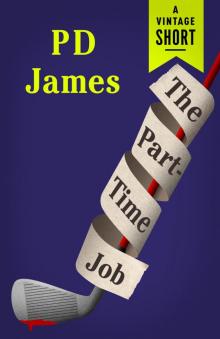 The Part-Time Job
The Part-Time Job Death in Holy Orders
Death in Holy Orders The Victim
The Victim Shroud for a Nightingale
Shroud for a Nightingale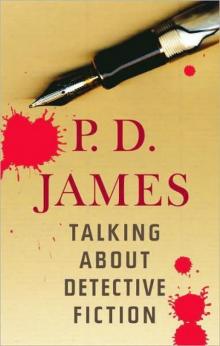 Talking about Detective Fiction
Talking about Detective Fiction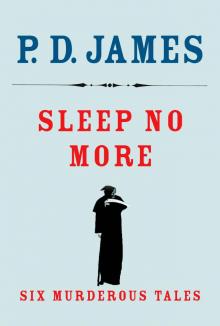 Sleep No More
Sleep No More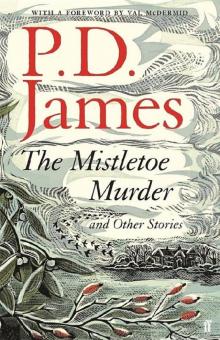 The Mistletoe Murder and Other Stories
The Mistletoe Murder and Other Stories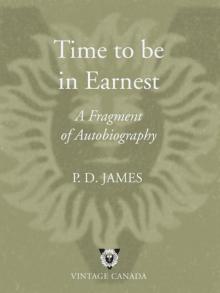 Time to Be in Earnest
Time to Be in Earnest Original Sin
Original Sin A Mind to Murder
A Mind to Murder Cover Her Face
Cover Her Face Innocent Blood
Innocent Blood Devices and Desires
Devices and Desires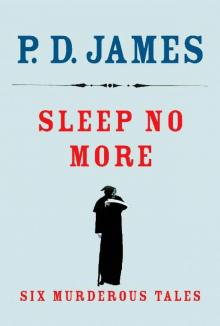 Sleep No More: Six Murderous Tales
Sleep No More: Six Murderous Tales Death Comes to Pemberley
Death Comes to Pemberley The Mistletoe Murder
The Mistletoe Murder Death of an Expert Witness
Death of an Expert Witness The Private Patient
The Private Patient The Black Tower
The Black Tower Devices & Desires - Dalgleish 08
Devices & Desires - Dalgleish 08 Unnatural Causes
Unnatural Causes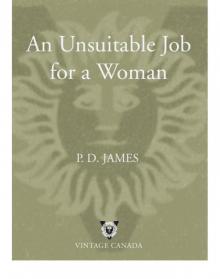 An Unsuitable Job for a Woman
An Unsuitable Job for a Woman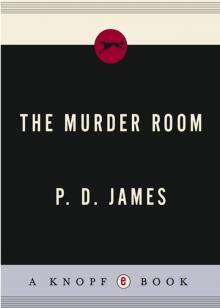 The Murder Room
The Murder Room A Certain Justice
A Certain Justice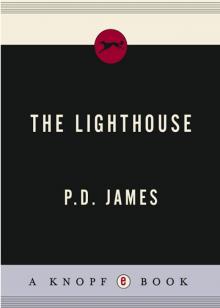 The Lighthouse
The Lighthouse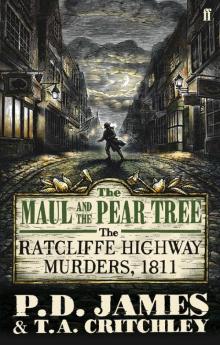 The Maul and the Pear Tree
The Maul and the Pear Tree